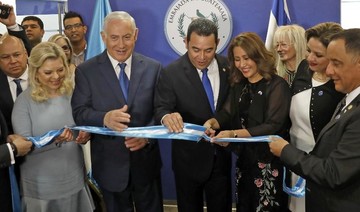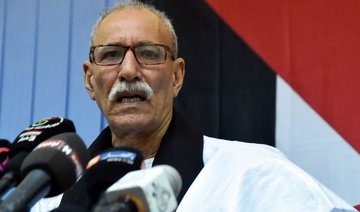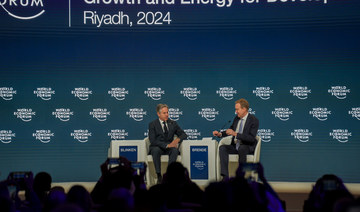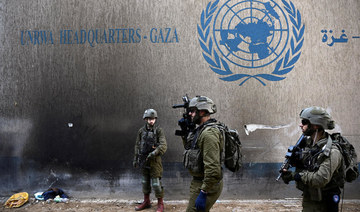RABAT: Rabat has shelved plans to for a twin city partnership with Guatemala City in protest against Guatemala’s transfer of its Israel embassy from Tel Aviv to Jerusalem, the Moroccan capital’s deputy mayor said on Saturday.
“Following Guatemala’s decision to establish an embassy in Al-Quds (Jerusalem), Rabat’s city council unanimously decided to suspend the examination of a twinning project with Guatemala City in solidarity with the Palestinian people,” deputy mayor Lahcen El Amrani of the Islamist PJD party told Reuters.
Guatemala opened an embassy in Jerusalem on Wednesday, two days after the United States inaugurated its new site there, a move that infuriated Palestinians and drew international condemnation.
Israel considers Jerusalem its capital and Palestinians also hope one day to have the capital of independent state there. Most countries have their Israel embassies in Tel Aviv, arguing that the status of Jerusalem must be determined in future talks.
On the day the United States opened its new embassy, Israeli troops killed 60 Palestinian demonstrators at the border in Gaza. Israel says the violence was incited by Hamas, the Islamist group that runs Gaza. Hamas denies blame.
The Rabat city council had previously planned to vote on a twinning project with Guatemala City last week. Guatemala opened an embassy in Rabat, its second in Africa, in November 2017.
Rabat suspends twin city plan with Guatemala over Jerusalem move
Rabat suspends twin city plan with Guatemala over Jerusalem move
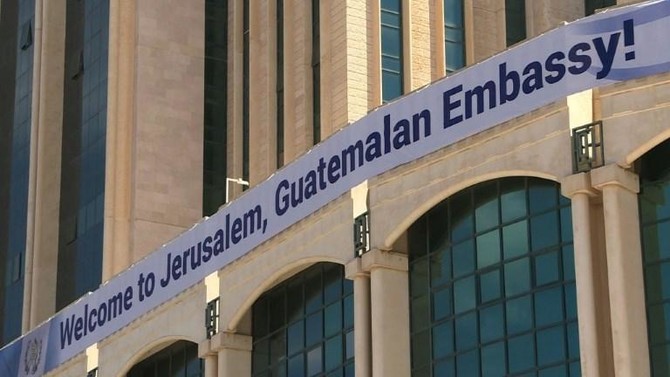
Only two states for Israel and Palestine can prevent all-out regional conflict: Egypt PM
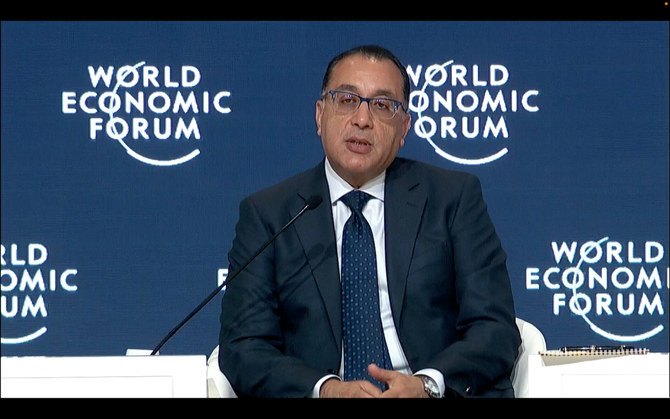
- Israel risking its future, says Egypt official at World Economic Forum
- Jordan’s PM also accuses Tel Aviv of not wanting ‘a political solution’
RIYADH: Only a two-state solution for Israel and Palestine can prevent the outbreak of an all-out regional and possible global conflict, said Egypt’s Prime Minister Mostafa Madbouli at the World Economic Forum here on Monday.
Participating in a panel discussion on Gaza, Madbouli said that if the current situation continues this would also affect the future of Israel.
“It is now or never, the whole world should unite to recognize the rights of Palestinians to have their own state. If you could imagine that postponing this will solve the problem, or will be in Israel’s interest, you are wrong. It will be against the future of Israel itself.”
He added: “We are speaking about a nation that has been under aggression and occupation for the past 75 years. Behind closed doors, everybody recognizes their right to exist, but when it comes to reality, and to have a solid solution, everybody is refraining.”
Madbouli said a two-state solution is the only remedy to achieve regional peace.
“It is today that we all have to push for a two-state solution, along with a serious regional solution. No one can imagine the situation if a regional war had to start. If you imagine that you are far then you are in a very elusive situation, everybody will be affected. We have already seen a sample of a war between Iran and Israel this month.”
Other panelists, including Jordan’s Prime Minister Bisher Al-Khasawneh and Sigrid Kaag, the UN humanitarian and reconstruction coordinator for Gaza, expressed their frustration with the situation on the ground.
Al-Khasawneh said: “This is indeed an extremely timely event, challenging and depressing. There are a lot of diplomatic activities underway, along with the continued Israeli aggression on Gaza and the potential for another catastrophic additional aggression on Rafah, which by all standards will be a catastrophe that adds on to a catastrophe that has led to conditions close to famine in Gaza.”
He said the damage caused by Israel’s campaign is estimated to be about $18.7 billion; and that the UN reports that 1.1 million children require psychological counseling.
Al-Khasawneh also called for a two-state solution: “Israel insists on making the same mistakes, and expecting different results, which is not engaging seriously in a political solution.”
He added: “The world seems to be falling into the trap of following the agenda of narrow-minded Israeli politicians, frankly speaking, and it is quite catastrophic. Today it is about the political calculations of some politicians in Israel at the expense of, the safety of Israelis, the safety of Jordanians, Egyptians, and all the Arabs. Today it’s the safety of the whole region and beyond.”
Kaag said a political solution has to be found. “If we look ahead, the reconstruction efforts, from an investment perspective, are all tied to the political parameters, the two-state solution.”
Kaag added: “The paradigm shift is in the now, but it’s also looking towards the future because of the level of destruction and despair, people there tell you that they feel like zombies. The mental health crisis is humongous. So, we need to create hope through investment, rehabilitation, and focus on the political effort. I think we failed the Palestinians countless times, and they deserve more human rights.”
Egypt ‘hopeful’ of new Israel-Hamas truce: foreign minister
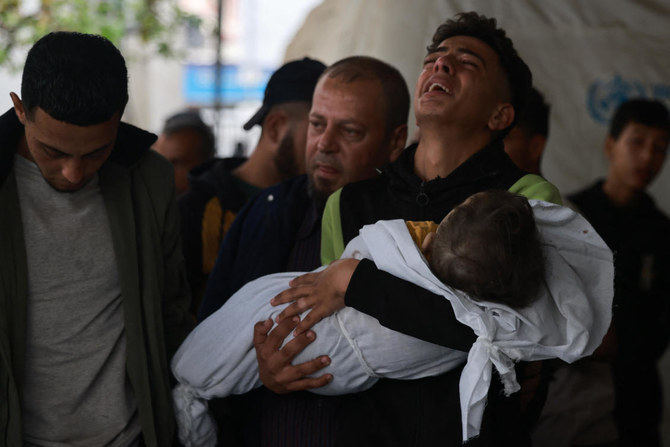
- A Hamas delegation was due in Egypt on Monday, where it is expected to respond to Israel’s latest proposal for a truce in Gaza
Riyadh: Egypt’s foreign minister said he was “hopeful” about a new proposal for a truce in Gaza as a Hamas delegation was due in Cairo for talks on Monday.
“There is a proposal on the table (and it’s) up to the two sides to consider and accept,” Sameh Shoukry said in Riyadh at the World Economic Forum.
“We are hopeful,” he added, explaining that “the proposal has taken into account the positions of both sides and has tried to extract moderation.”
“We are waiting to have a final decision. There are factors that will have an impact on both side’s decisions, but I hope that all will rise to the occasion.”
Egypt, Qatar and the United States have been trying to mediate an agreement between Israel and Hamas for months, but a flurry of diplomacy in recent days appeared to suggest a new push toward halting the fighting.
A Hamas delegation was due in Egypt on Monday, where it is expected to respond to Israel’s latest proposal for a truce in Gaza and a release of hostages after almost seven months of war.
A senior Hamas official said on Sunday that the Palestinian group had no “major issues” with the most recent truce plan.
“The atmosphere is positive unless there are new Israeli obstacles,” the official told AFP, requesting anonymity to discuss the negotiations.
Israel concerned over possible ICC arrest warrants related to Gaza war
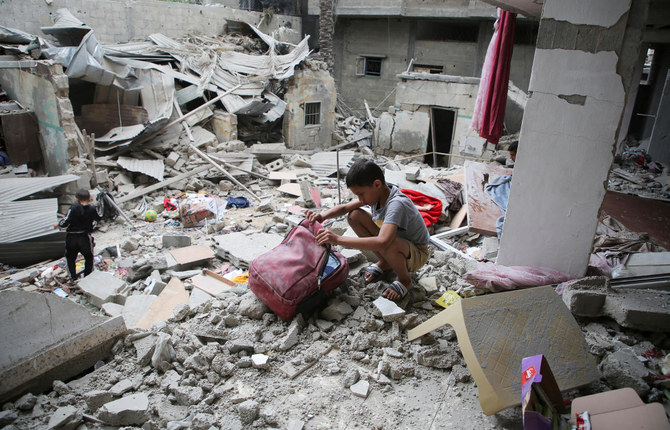
- Prime Minister Benjamin Netanyahu said on Friday that any ICC decisions would not affect Israel’s actions but would set a dangerous precedent
- Israeli officials are worried the court could issue arrest warrants against Netanyahu and other top officials for alleged violations in Gaza
JERUSALEM: Israel is voicing concern that the International Criminal Court could be preparing to issue arrest warrants for government officials on charges related to its war against Hamas.
The ICC — which can charge individuals with war crimes, crimes against humanity and genocide — is investigating Hamas’ Oct. 7 cross-border attack and Israel’s devastating military assault on Hamas-ruled Gaza, now in its seventh month.
In response to Israeli media reports that the ICC might soon issue arrest warrants for senior Israeli government and military officials, Foreign Minister Israel Katz on Sunday warned Israeli embassies to bolster their security because of the risk of a “wave of severe antisemitism.”
“We expect the court (ICC) to refrain from issuing arrest warrants against senior Israeli political and security officials,” Katz said. “We will not bow our heads or be deterred and will continue to fight.”
Prime Minister Benjamin Netanyahu said on Friday that any ICC decisions would not affect Israel’s actions but would set a dangerous precedent.
Israeli officials are worried that the court could issue arrest warrants against Netanyahu and other top officials for alleged violations of international humanitarian law in Gaza, Israeli media have reported.
They said the ICC is also considering arrest warrants for leaders from Hamas.
The ICC, based in The Hague, and Hamas, Gaza’s ruling group, did not immediately respond to requests for comment.
Israel is not a member of the court and does not recognize its jurisdiction, but the Palestinian territories were admitted with the status of a member state in 2015.
In October, ICC Chief Prosecutor Karim Khan said the court had jurisdiction over any potential war crimes committed by Hamas fighters in Israel and by Israeli forces in the Gaza Strip.
Khan has said his team is actively investigating any crimes allegedly committed in Gaza and that those who are in breach of the law will be held accountable.
On Oct. 7, Hamas led an attack on Israeli military bases and communities in which 1,200 people were killed, mostly civilians, and 253 were taken as hostages, according to Israeli tallies.
Israel has since launched a ground, air and sea offensive that has killed more than 34,000 Palestinians, according to Gaza authorities, and has laid much of the small, densely populated coastal territory to waste.
The Gaza Health Ministry does not distinguish between combatants and non-combatants in its casualty reports but most of the fatalities have been civilians, health officials say.
Israel says that it takes precautions to minimize civilian deaths and that at least a third of the Gaza fatalities are combatants, figures that Hamas has dismissed.
Israel’s military campaign has displaced most of the blockaded Palestinian enclave’s 2.3 million people and created a humanitarian crisis.
The case at the ICC is separate from a genocide case launched against Israel at the International Court of Justice, also based in The Hague.
The ICJ, also known as the World Court, is a United Nations court that deals with disputes between states, while the ICC is a treaty-based criminal court focusing on individual criminal responsibility for war crimes.
Likely attack by Yemen’s Houthis targets a vessel in the Red Sea
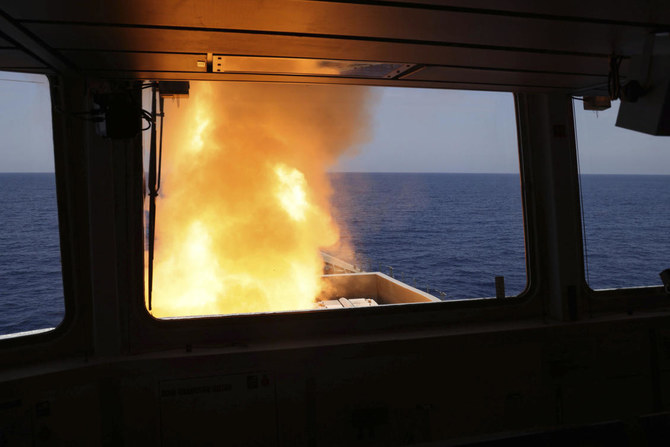
- The attack happened off the coast of Mokha, Yemen
- The Houthis did not immediately acknowledge any attacks
JERUSALEM: A suspected attack by Yemen’s Houthis targeted a vessel in the Red Sea on Monday, authorities said, the latest assault in their campaign against international shipping in the crucial maritime route.
The attack happened off the coast of Mokha, Yemen, the British military’s United Kingdom Maritime Trade Operations center said, without offering any other immediate details.
It urged vessels to exercise caution in the area.
The Houthis did not immediately acknowledge any attack there, though suspicion fell on the group. It typically takes the militia several hours before claiming their assaults.
The Houthis say their attacks on shipping in the Red Sea and Gulf of Aden are aimed at pressuring Israel to end its war against Hamas in Gaza, which has killed more than 34,000 Palestinians there. The war began after Hamas-led militants attacked Israel on Oct. 7, killing 1,200 people and taking some 250 others hostage.
The Houthis have launched more than 50 attacks on shipping, seized one vessel and sank another since November, according to the US Maritime Administration.
Houthi attacks have dropped in recent weeks as the militia has been targeted by a US-led airstrike campaign in Yemen. Shipping through the Red Sea and Gulf of Aden has declined because of the threat.
American officials have speculated that the militia may be running out of weapons as a result of the US-led campaign against them and after firing drones and missiles steadily in the last months. However, the Houthis have renewed their attacks in the last week.
The Houthis on Saturday claimed it shot down another of the US military’s MQ-9 Reaper drones, airing footage of parts that corresponded to known pieces of the unmanned aircraft. US Air Force Lt. Col. Bryon J. McGarry, a Defense Department spokesperson, acknowledged to The Associated Press on Saturday that “a US Air Force MQ-9 drone crashed in Yemen.” He said an investigation was underway, without elaborating.
Nations must find ways to unite on ‘issues that affect planet’: UAE adviser
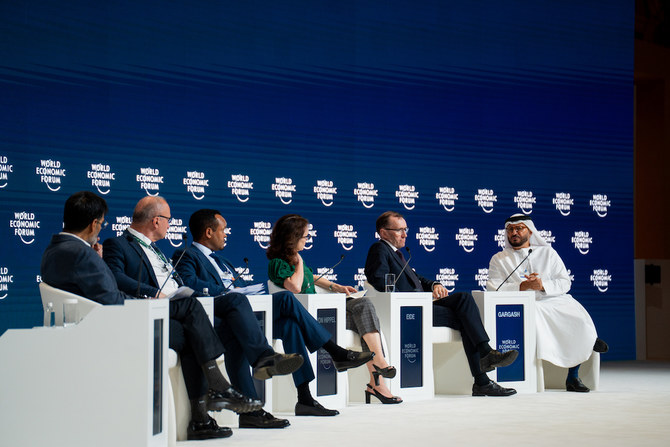
- Tech, climate are key, says Anwar Gargash at World Economic Forum
- Norway FM highlights credibility ‘crisis’ of global, Western institutions
RIYADH: Nations must look for ways to unite on issues that “affect the planet” for the prosperity and stability of the global community, a senior UAE official told a World Economic Forum session here on Monday.
“We have to find a way that non-geostrategic issues should bring us together, rather than take us apart. I think technology, climate should bring us together because we have a vested interest,” said Anwar Gargash, diplomatic adviser to the UAE president, during a panel discussion titled “Rising Powers for a Multipolar World.”
“We might all argue about who pays what, how fast it should go … but ultimately we should recognize that these issues that affect the planet are issues that we will all suffer from,” he added.
Gargash said that “to some certain extent we have a knack for politicizing these issues rather than making these issues an adhesive that brings us together.”
Another panelist, Croatia’s Foreign Affairs Minister Gordan Grlic Radman emphasized the importance of multilateral relationships, “not replacing them … and not watering down rules-based order. Rules are there to respect them.”
Espen Barth Eide, Norway’s foreign affairs minister, added that the global community was experiencing a crisis of credibility. This has been exacerbated by the situation in Gaza and by “the inability of many Western countries who have hesitated to use the same type of language … they used against Russia.”
“When it comes to Gaza, we have not been able to see the same type of response … the way that Israel has conducted the war has also been very problematic in light of global norms. If we do not call out that it comes back and haunt even the arguments on Ukraine,” Eide said.
“To be frank it is a crisis of Western-initiated values, but they also have turned into a crisis of institutions. The response to that is to be very clear on our own practice, as Norway, with friends. If we believe certain things are right or wrong, we should apply them consequentially across the board.”
Gargash said that building bridges and making friends has been the UAE’s strategy. “We see ourselves more on the geo-economic phase of our foreign policy. That in itself reflects what are our priorities with regards to BRICS or any other international organization we seek to join.
“We are increasing and concretizing the sort of bridges that we have. We are looking at it more on the geo-economic perspective. We have no interest in creating further schisms within the international system. We have an interest in being able to reach out on all our friends, and create more opportunities.
“Countries like us cannot afford to be fatalistic, and see this things are happening anyway. I think we need to work, whether in smaller or larger groups, it depends really on the situation … whether we will be more effective working with an Arab consensus, then we will do it.
“We are interested in joining many other organizations, we are looking at it from the perspective of having more friends, more bridges, more economic opportunities rather than a rejection of something and an adoption of something else.”
Citing the China-US relationship in the past, the UAE official said that “we should remember that this is not 1945, it is our duty as other countries to emphasize always that we are not at that moment and we do not want to recreate that bipolarity of the past.”
Gargash added: “The important thing is it is our job, whenever the China-US relationship is on the table, not to think in (a) 1945 framework but to say this is a different world. India today is not the India of 1945, Europe is not the Europe of 1945. There are many other players, we cannot ease the other players out and think of just the two major parties.”


